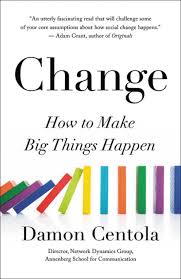
Change
These days, we are all obsessed with the ways viruses spread. Even before COVID, many social scientists were interested in why things went viral, especially on the Internet. Now, we watch the exponential growth of the literal spread of a virus every day.
Damon Centola of the Annenberg School at USC, wants us to understand that viral growth models do not always work because network researchers like himself that the spread of an idea or anything else is often limited when it comes up against any of a number of “resistances” to the spread of information in what he calls complex contagions. For the kinds of changes he and I are both interested, you also have to change norms, which means that you also have to confront the biases and habits and everything else that people bring to the table.
He works his way through an amazingly broad social science literature that goes back to the likes of Paul Lazarsfeld who were central to my own training as a political scientist. But he brings the work up to date by considering things like the Arab Spring, the spread of Twitter in which weak ties turned out to be quite weak, the adoption of contraception in which strong ties mattered, and even some hints about what we knew about COVID when he was finishing this book.
In short, this is a wonderfully insightful and engaging book that will help peacebuilders understand that networks are not the simplistic answer to all of our problems with growing our field.
